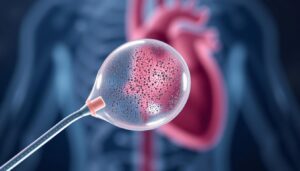Did you know prostate cancer affects about 1 in 8 men in their lifetime1? Knowing about prostate health is key for every man’s well-being. This guide will give you the knowledge to keep your prostate healthy and avoid risks2.
Your prostate is vital for your health, but many men don’t know how important it is. The risk of prostate cancer goes up with age, especially after 65, when about 60% of cases are found1. African American men are at even higher risk, facing more health problems2.
Being proactive is important. By knowing your body and making smart health choices, you can lower your risk of prostate problems. Regular check-ups, healthy living, and smart medical choices can greatly improve your health in the long run3.
Key Takeaways
- Prostate cancer is a big health issue for men
- Age and race can affect prostate cancer risk
- Early detection and prevention are key
- Healthy choices can help your prostate
- Regular medical check-ups are vital
Understanding Your Prostate: A Vital Guide to Men’s Health
Your prostate gland is key to male health, but many men know little about it. Knowing its role and health issues can help you stay healthy.
Prostate Gland Anatomy and Function
The prostate gland is a small organ under the bladder. It makes seminal fluid to feed and protect sperm. It also helps push semen out during ejaculation.
- Located just below the bladder
- Weighs approximately 30 grams in adult males
- Critical for reproductive system health
Common Prostate Health Concerns
Men face several health issues that can affect their life quality. These include:
- Benign Prostatic Hyperplasia (BPH)
- Prostatitis
- Prostate Cancer4
Prostate cancer is a big concern, with 299,010 new cases in the U.S. each year4. More than two-thirds of diagnoses occur in men over 654.
Prostate Risk Factors and Warning Signs
Knowing the risk factors can help with early detection and prevention. Key risk factors include:
| Risk Factor | Impact |
|---|---|
| Age | Risk increases after 50 |
| Family History | Can double or triple risk4 |
| Race | Black men 60% more likely to be diagnosed4 |
Warning signs include trouble urinating, blood in urine, or pelvic pain. Regular check-ups are key for early detection and managing health concerns.
Prevention Strategies for Optimal Prostate Health
Managing your prostate health means more than just doctor visits. It’s about making lifestyle choices and using wellness strategies. A good plan for prostate health is all about being whole, not just treating symptoms.
Focus on several important areas for your prostate wellness:
- Nutrition and dietary changes
- Regular health check-ups
- Staying active and exercising
- Learning to handle stress
What you eat is key to keeping your prostate healthy. Add these nutrients to your diet:
| Nutrient | Recommended Daily Intake | Potential Benefits |
|---|---|---|
| Calcium | 500-1500 mg | Supports cellular health5 |
| Vitamin D | 200-1000 IU | Helps your body absorb nutrients better |
| Curcumin | 500 mg twice daily | May fight inflammation5 |
Exercise is also vital for prostate health. It helps lower inflammation, keeps your weight in check, and boosts prostate function.
“Prevention is always better than cure when it comes to prostate health.” – Men’s Health Experts
By following these prevention tips, you can protect your prostate health for the long run. A proactive attitude and smart choices can greatly improve your health5.
The Prostate Playbook: Essential Knowledge for Every Man
Protecting your prostate is a big job that needs a smart plan. This plan should include prevention, daily habits, and lifestyle changes. Knowing how to keep your prostate healthy can lower your risk of prostate cancer and boost your overall health.
Strategic Approaches to Prostate Cancer Prevention
Starting early is key to fighting prostate cancer. Men facing this disease are looking for new ways to treat it6. Science has found ways to slow down cancer growth6.
- Watch out for age-related risks, especially after 503
- Know your racial risks2
- Keep your weight in check to lower cancer risks3
Daily Habits for Prostate Wellness
Your daily life affects your prostate health a lot. Eating veggies and watching your alcohol and sugar intake are key6.
| Habit | Impact on Prostate Health |
|---|---|
| Nutrition | Eat veggies, limit sugar and alcohol |
| Physical Activity | Do regular workouts and walk |
| Sleep | Make sure you get good rest |
Lifestyle Modifications That Matter
Changing your lifestyle can greatly help your prostate. Physical activity and stress management are key to fighting prostate cancer6. The book focuses on mental skills, nutrition, and exercise6.
Your daily choices can greatly affect your prostate health and overall well-being.
By following these strategies for prostate wellness, you can manage your health better. This can help lower your risk of prostate cancer.
Nutrition and Diet: Your First Line of Defense

Your diet is key to keeping your prostate healthy. Eating right is more than just food; it’s about making choices that help prevent prostate problems7. Studies show that what you eat can greatly affect your prostate health, making your food choices very important.
Adding certain nutrients to your diet can help a lot. Here are some foods that are good for your prostate:
- Tomatoes (rich in lycopene)
- Fatty fish with omega-3s
- Nuts and seeds
- Green vegetables
Research has shown some interesting things about food and health. It’s found that 93% of studies funded by food companies had results that looked good for them7. This shows how important it is to carefully look at the advice you get about food.
| Nutrient | Prostate Health Benefits | Recommended Sources |
|---|---|---|
| Lycopene | Antioxidant protection | Tomatoes, watermelon |
| Selenium | Cell protection | Brazil nuts, seafood |
| Omega-3 | Inflammation reduction | Salmon, sardines |
Your diet should be full of whole foods and avoid processed foods. Choose foods that are rich in nutrients. By making smart food choices, you’re taking care of your prostate health for the long term8.
“Let food be thy medicine and medicine be thy food” – Hippocrates
No single food can solve all problems. A balanced diet and regular check-ups are the best way to keep your prostate healthy.
Exercise and Physical Activity Guidelines for Prostate Health
Physical activity is key for prostate health and overall wellness. Knowing the right exercises can greatly improve your health and lower risks. Men who stay active enjoy better heart health and less stress9.
Cancer survivors face many health challenges, like weak muscles and not enough activity9. A good exercise plan can help fight these issues and support prostate health.
Pelvic Floor Exercises
Pelvic floor exercises are vital for prostate health. They help:
- Improve urinary control
- Enhance muscle strength
- Reduce prostate-related problems
Cardiovascular Activities
Cardio exercises are crucial for prostate health. Men with good heart fitness have a 45 percent lower risk of cancer death than those who are less fit9. Try activities like:
- Brisk walking
- Swimming
- Cycling
- Moderate-intensity aerobic exercises
Strength Training Recommendations
Strength training is great for prostate health. Men with prostate cancer find less stress and better self-esteem with regular exercise10. Focus on exercises for:
- Lower body muscle groups
- Core muscle strength
- Overall muscle conditioning
Consistency is key in maintaining prostate health through physical activity.
Managing Prostate Health: Key Medical Screenings
Keeping your prostate healthy means regular check-ups and tests. Knowing which tests are important can help find problems early11. It’s key for men to know about the screenings that watch for health risks.
There are two main tests for prostate health:
- Prostate-Specific Antigen (PSA) Test
- Digital Rectal Exam (DRE)
The PSA test looks for a protein in prostate cells that might show issues. But, only a small part of high PSA results mean cancer12. This shows why a full check is so important.
| Screening Method | Purpose | Recommended Frequency |
|---|---|---|
| PSA Test | Detect potential prostate abnormalities | Annually after age 50 |
| Digital Rectal Exam | Physical examination of prostate | Annually after age 50 |
As you get older, your risk of prostate problems grows. About 1 in 7 men will get prostate cancer in their life12. African-American men are at even higher risk, with 1 in 5 likely to get cancer12.
Talking to your doctor about prostate tests is vital, especially if prostate cancer runs in your family. Finding problems early can greatly improve treatment chances11.
Treatment Options and Side Effect Management
Finding the right prostate treatment can be tough. But knowing your options helps you make better choices for your health. Your prostate care journey is about picking treatments that work well and keep your quality of life good13.
Men dealing with prostate issues have many treatment paths to explore. The goal is to find a plan that fits your health needs and reduces side effects14.
Conservative Treatment Approaches
Conservative prostate treatments are less invasive:
- Active surveillance for low-risk conditions
- Lifestyle modifications
- Medication management
- Targeted nutritional interventions
Managing Treatment Side Effects
Your healthcare team is key in managing side effects from prostate treatment. About 77% of urologists now use shared decision-making to help patients understand what to expect14.
Common ways to manage side effects include:
- Erectile function support
- Incontinence rehabilitation
- Mental health counseling
- Targeted physical therapy
Recovery and Rehabilitation
Recovering from prostate treatment needs a full plan. Patients do best with personalized plans that cover physical and emotional healing13.
Your active role in recovery greatly affects your long-term health and happiness.
Prostate treatment options are getting better, with a focus on care that’s centered on the patient. This approach aims to reduce invasive treatments and boost overall well-being14.
Living a Prostate-Healthy Lifestyle

Keeping your prostate healthy is a big job that needs focus and smart choices. It starts with knowing how everyday actions affect your health. Men over 50 should watch their health closely, as the risk of prostate problems grows with age3.
Important steps for a healthy prostate include:
- Regular medical check-ups
- Eating well
- Staying active
- Managing stress
Your diet is key to a healthy prostate. Eating foods full of antioxidants, omega-3s, and important nutrients helps fight inflammation and keeps cells healthy. Black men should be extra careful, as they face a higher risk of prostate cancer3.
Being active is also vital for a healthy prostate. Try to:
- Do 30 minutes of moderate exercise every day
- Do strength training 2-3 times a week
- Choose activities that improve blood flow
Don’t forget about your mental health. Stress-reducing activities like meditation, yoga, and staying connected with friends can help your health and lower cancer risks11.
Your prostate health is a lifelong commitment that requires holistic attention and proactive management.
Early detection is crucial. Men over 50 should get regular check-ups and talk about their risk with doctors11.
Conclusion
Understanding prostate health is key. This guide shows how early detection and lifestyle changes are crucial15. Knowing your risk and staying healthy can greatly improve your life16.
Knowledge is your best ally. Regular health checks, a balanced diet, and exercise are vital17. These steps help protect your health and increase your chances of early treatment.
Your health path is unique. While global data is helpful, your personal actions are most important. Talk to doctors, learn about new research, and focus on your health. By following this guide, you’re making big strides in keeping your prostate and overall health in top shape16.
FAQ
What is the prostate gland and why is it important?
At what age should I start thinking about prostate health?
What are the most common prostate health concerns?
How can I naturally support my prostate health?
What foods are beneficial for prostate health?
What screening tests are recommended for prostate health?
Can exercise really impact prostate health?
What are the warning signs of potential prostate problems?
Are there supplements that can support prostate health?
How does stress impact prostate health?
Source Links
- The Prostate Playbook – The Nile – https://www.thenile.com.au/books/craig-allingham/the-prostate-playbook/9780987076670?srsltid=AfmBOopP4KR8m3O85zCmDHvHsy_Cr6q2xYh102gPbOHCVMsJ4i4KyjOH
- Fostering shared decision-making about prostate cancer screening among African American men patients and their primary care providers: a randomized behavioral clinical trial – https://pmc.ncbi.nlm.nih.gov/articles/PMC9375278/
- PCC_Playbook_v4 – https://cdn.cancer.ca/-/media/files/cancer-information/resources/publications/your-prostate-cancer-playbook/pcc_playbook_v7_en.pdf?rev=ff5c608c57d34855a7f4a2b21b14db5b&hash=185FAE0606F06D5101B37F8CB7FB946F
- ACCC Recognizes National Prostate Cancer Awareness Month – https://www.accc-cancer.org/acccbuzz/blog-post-template/accc-buzz/2024/09/27/accc-recognizes-national-prostate-cancer-awareness-month
- Supplements – Cancer Playbook – https://cancerplaybook.org/interventions/supplements/
- The Prostate Playbook – The Nile – https://www.thenile.com.au/books/craig-allingham/the-prostate-playbook/9780987076670?srsltid=AfmBOor_WU2Ftt4a0GedwqJsAfukdhiHXGs_oIGpC2WhAJEhHsrIPfY0
- Marion Nestle | How Companies Skew the Science of What We Eat | Jordan Harbinger – https://www.jordanharbinger.com/marion-nestle-how-companies-skew-the-science-of-what-we-eat/
- The Team Builder – https://www.philanthropyroundtable.org/magazine/the-team-builder/
- Proceedings of a Workshop – Incorporating Weight Management and Physical Activity Throughout the Cancer Care Continuum – https://www.ncbi.nlm.nih.gov/sites/books/NBK481842/
- One Small Step – https://www.ualberta.ca/en/newtrail/research/one-small-step.html
- The Prostate Playbook: Understanding the Stages of Prostate Cancer and the Treatment Game Plan – Urology Clinics of North Texas – https://urologyclinics.com/blog/the-prostate-playbook-understanding-the-stages-of-prostate-cancer-and-the-treatment-game-plan/
- PDF – https://www.auanet.org/documents/products/prostatehealthplaybook.pdf
- Decision Fatigue in Low-Value Prostate Cancer Screening – https://pmc.ncbi.nlm.nih.gov/articles/PMC8497012/
- PDF – https://www.auanet.org/documents/Guidelines/PDF/Implementation of Shared Decision Making into Urological Practice unabridged version.pdf
- Long-Term Remission – Vital Jake – https://vitaljake.com/long-term-remission/
- PDF – https://gamh.org/wp-content/uploads/2021/09/Delivering-Mens-Health-report.pdf
- Prostate Archives – Vital Jake – https://vitaljake.com/category/prostate/




